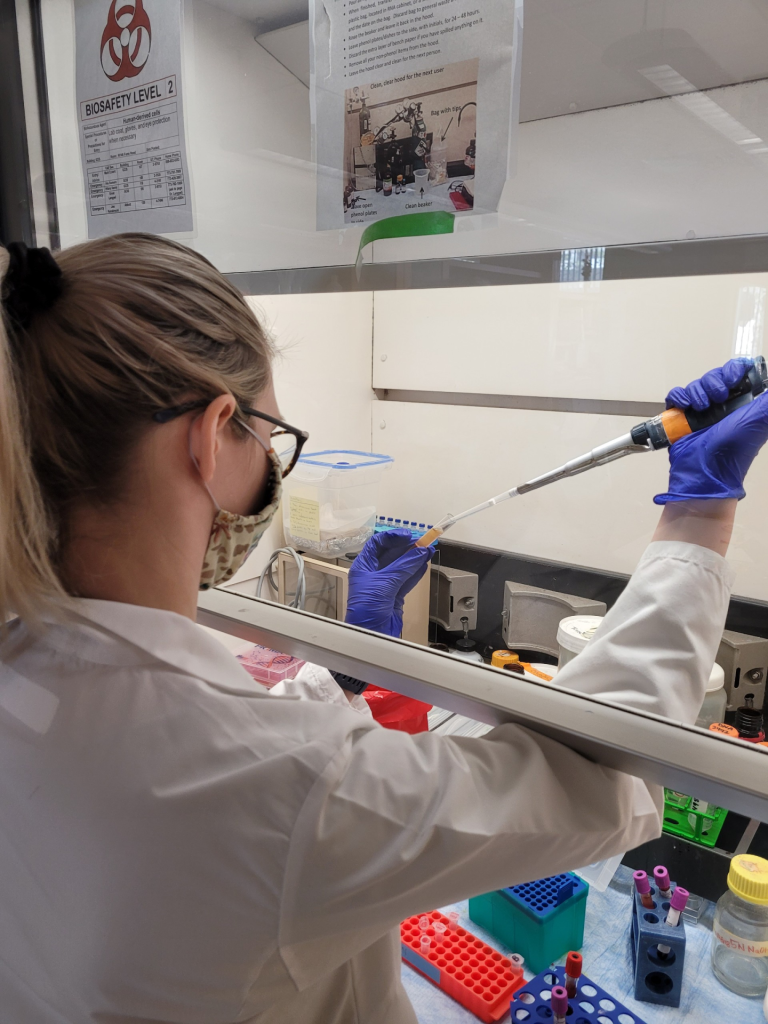
Dr. Melanie Weigert, of University of Chicago, is a 2021 recipient of OCRA’s Mentored Investigator Grant. With her project, “Genome-Wide Profiling of 5-hydroxymethylcytosine on Cell-Free DNA,” Dr. Weigert aims to identify biomarkers that can predict how cancer cells will respond to platinum-based treatments, helping guide patients with potentially platinum-resistant cancer toward alternative therapies.
Dr. Weigert’s grant was made possible in part by a generous donation from Jennifer Willett in memory of Lynne Willett.
What initially sparked your interest in science?
It might sound like a cliché, but I have always been interested in how and what makes things work. This did not just apply to biology but also to chemistry and physics. Being a girl and being good in science was considered kind of weird and nerdy when I was young, but thankfully I had some very engaging and amazing teachers that supported and encouraged me.
What drew you to the field of ovarian cancer research?
While I personally have not had any family history of ovarian cancer, for me as a woman, ovarian cancer is a scary disease considering the low survival rates and poor outcomes for women affected by it. While a lot of research has been done over the past decade, we have barely scratched the surface. While we increased research efforts, we have not been able to improve survival rates or discover new effective therapies. By doing ovarian cancer research, I am hoping to be able to help all mothers, sisters, daughters, granddaughters, and friends by helping them spend more time with their loved ones.
Can you explain your research project?
I am trying to find clues in the blood that can tell me if someone with ovarian cancer will respond to therapy or not.
What motivates you to persist in your research?

Ovarian cancer is a devastating disease that shortens the valuable time we can spend with family, friends and loved ones. I want to be able to give everyone the opportunity to live a full and happy life. I also feel incredibly motivated by all the patients who are so generous to donate research samples to us. These women most likely experience one of the worst times of their lives being diagnosed with ovarian cancer, but they still find the generosity and courage to donate precious research specimens to help us advance our understanding of the disease. They do this knowing that it will not directly benefit them, but future patients.
What is your hope for the field of ovarian cancer research?
I am hoping that we can increase the overall survival of women diagnosed with ovarian cancer in the future. As a woman, I believe that we can achieve this by empowering women and raising ovarian cancer awareness! As a scientist, I strongly believe that we can develop new early screening tests and therapies by increasing our knowledge of the biology of ovarian cancer. I hope that our increased knowledge and efforts in ovarian cancer research will allow physicians to offer new therapeutic alternatives and identify ovarian cancer earlier, thus extending survival rates.
If you had the opportunity to personally thank someone from the OCRA community who supported your work, what would you say?
I would love to thank all who are actively advocating and raising funds for ovarian cancer research and OCRA. I would also love to thank everyone who spends their free time reviewing grants and performing volunteer work for OCRA. Having done volunteer work and having raised funds myself, I know that it involves a lot of work, effort, and dedication.
I am especially feeling grateful towards my personal sponsor, Jennifer Willett, who generously donated to my research project. Knowing that people believe in the value of my research and its potential contribution to the wider community motivates me incredibly.
See more OCRA-funded research projects focused on drug resistance and biomarkers.


